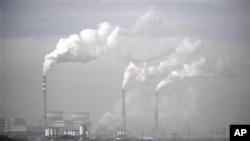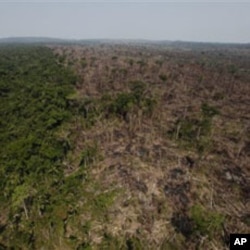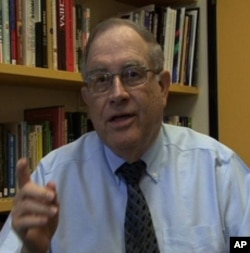Given the widespread disappointment in the outcome of last year's United Nations Climate Change Conference in Copenhagen, expectations for the upcoming meeting in Cancun, Mexico (Nov 29-Dec 10) are much more limited. But, environmental activists say there are many incremental steps that can be taken by governments attending the conference to advance world efforts to mitigate both global warming and its adverse consequences.
Although last year's climate conference in Copenhagen did produce consensus on some issues, it failed to produce a treaty that would bind nations to limits on their greenhouse gas emissions.
Commitment
While nations agree in general on the need to reduce emissions, they are often reluctant to commit themselves to measures that they think could imperil their own economic growth.
These national concerns, not the U.N.-sponsored process, prevented agreement in Copenhagen, according to the executive director of Climate Action Network International, David Turnbull.
"It wasn't because the U.N. is faulty, or because the consensus-based system is a problem," he said. "It's because the politics back home were not conducive to achieving an agreement. And they may not be conducive to achieving a complete, fair, ambitious, and binding agreement in Cancun - and we need to work as NGOs [non-governmental organizations] to change those politics, and have governments recognize that it's in their best interest to address climate change."
Turnbull says participants in the Cancun meeting should concentrate on plans to help poorer nations reduce emissions without jeopardizing development.
"We want to see them put forward low-carbon action plans, or zero-carbon action plans. These are plans that allow for countries to develop, but look towards low-carbon, cleaner ways of developing," he said.
Deforestation, rise in emissions
One area where nations could make progress in Cancun is deforestation, which scientists say is a major contributor to global warming. Turnbull also expects to see progress in creating a global climate fund to support development of projects and technologies that would reduce greenhouse gas emissions.
Scientists are most concerned about the rise in emissions from factories, power plants and vehicles in rapidly developing nations like China and India. China, which is now the world's biggest emitter of carbon and other greenhouse gases, promised to take action on its own at last year's meeting, but there are some indications that China may not follow through completely.
At Rice University's Baker Institute for Public Policy, Science policy analyst Neal Lane sees China's commitment as a key part of advancing worldwide action on climate change.
"I think the real challenge will be to be sure that China sticks to what it agreed to in Copenhagen and, of course, the United States, the [Obama] administration, is going to stick to what it agreed to," said Lane.
Without binding agreements, however, there is no mechanism to determine if a country is taking effective action and there are no consequences if they are not.
Transparency
Lane, a former science advisor to President Clinton who worked on some of the early climate change conferences, says he hopes Cancun helps foster more transparency.
"I would expect some more progress on that issue of transparency because trust is really a big deal here. Often the reason nations cannot even come together on what seems reasonable is because they do not trust one another," he said.
Lane says he also expects to see participants in Cancun do more on adaptation, with money from richer countries being used to help poor nations that are most likely to feel the effects of climate change in the decades ahead.
Lane says he himself was skeptical about how bad these effects might be some years back, but he says the science convinced him of the grave threat.
"When I talked to the people who were doing climate science, who were measuring temperature change, sea level rise and doing the climate modeling, those were the people who were most fearful. Those were the people who felt most strongly about the negative consequences of climate change. So that got my attention," said Lane.
Neal Lane says he hopes there will be progress in Cancun, because the world depends on it.






